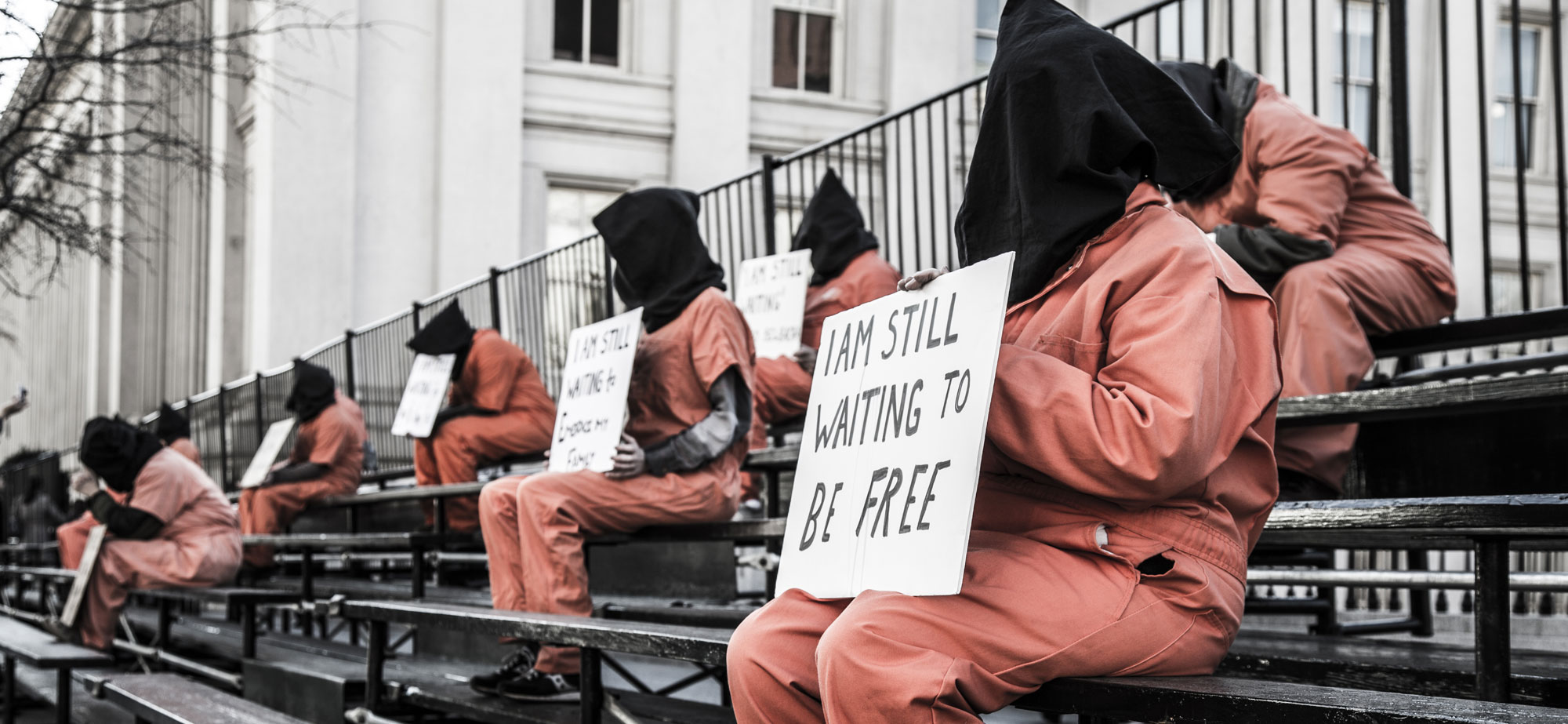From the Archive
US Human Rights Advocates Hold Protest at Guantánamo Naval Base
Demand Release of Detainees, Closure of the Detention Center and US Base
Activists Decry Islamophobia in the US Following Terrorist Attacks

As people in the United States enjoys Thanksgiving with their families, 14 human rights activists with Witness Against Torture are in Cuba protesting the ongoing operation of the US prison at Guantánamo Bay. At an encampment outside the base, the delegation demands that the prison close and that it not simply be moved to North America by holding men without charge or trial in federal prisons. The group returns November 30 from Guantánamo to Havana, where it will request a meeting with the US ambassador.
Forced-Feeding, Not Feasting at Guantánamo
On Thanksgiving Day (Nov. 26), the delegation will hold a vigil outside the base under the banner “Forced-Feeding, Not Feasting at Guantánamo.” The vigil highlights the continued forced-feeding of hunger striking prisoners, as well as the separation of the detained men from their families. The US activists are fasting in solidarity with the prisoners.
“While most people in the US are enjoying meals with their families,” says Marie Shebeck, a social worker in Chicago, Illinois, “I am fasting at the site of one of our country’s greatest shames. If the detained men can’t have a homecoming, we must bring our humanity to them.”
With its vigil, WAT seeks to bridge the distance between their encampment and men like Tariq Ba Odah, detained without charge since 2002. Tariq weighs 74 pounds after years of hunger striking. “Our actions are a simple act of solidarity,” says Chris Knestrick from Cleveland, Ohio. “We are here to say: We know you are suffering; we have come to stand with you.”
“There is real power in showing compassion to Guantanamo prisoners,” says Omar Farah, an attorney representing Tariq Ba Odah. “I saw firsthand when I visited him a week ago the impact of his learning that there are people beyond the prison wires who bear witness to his torment.”
Time is Up: Close Guantánamo Now
Witness Against Torture, which visited the detention camp in 2005, is returning after 10 years. “We are impatient. That is the understatement of the century,” says Frank Lopez, an educator from New York City. “Obama promised to close Guantánamo in 2008, calling it a moral outrage. But there are still 47 prisoners who have been cleared for release. It’s great that Shaker Aamer and a couple others have been freed recently. But whole prison must shut down.”
The protestors carry a stern message for President Obama and for those in Congress who have stood in the way of the prison’s closure. “Failing to close Guantánamo will be a terrible stain on Obama’s legacy,” says Jeremy Varon, a Professor of History in New York City. “Those lawmakers who worked to keep scores of innocent men imprisoned will be judged harshly by history.”
Close, Don’t Move Guantánamo
The Obama administration is developing a plan to move the men in Guantánamo to prisons in the US, while detaining some indefinitely without charge or trial. “Simply moving Guantánamo is no solution,” says Helen Schietinger of Washington, D.C. “That would mean holding on to the barbaric practice of indefinite detention. Besides, the entire domestic system of ‘correctional’ institutions is a travesty, poisoned by racism. We need to overhaul the US justice system, not add Guantánamo to it.”
Say No to Islamophobia
In the wake of attacks in Paris, Lebanon and Mali, Islamophobia rages in the US, evident in anti-Muslim violence and the bigoted statements of presidential candidates and others in positions of power. Witness Against Torture denounces this surge of xenophobia and hatred. “Our presence at Guantanamo is more important than ever,” says Jerica Arents, a professor from Chicago. “Guantanamo is the bitter legacy of the US’s devastating reaction to 9/11, which has meant the unjust detention and torture of Muslim men. This is a disgrace we can’t repeat.”
Many Faiths, One Message
Two Muslim Americans are on the trip. “It’s important for me to come to Guantánamo,” says Maha Hilal, Executive Director of the National Coalition to Protect Civil Freedoms, “to protest a ‘war on terror’ that has so callously and indiscriminately targeted Muslims. My identity as a Muslim obliges me to pursue justice, while my identity as a US citizen demands that I challenge my government’s role in the dehumanization and torture of Muslim prisoners.”
The delegation includes Catholics, Protestants, Muslims, Jews, Buddhists, and atheists. Many members are affiliated with the Catholic Worker movement, whose founder Dorothy Day was praised by Pope Francis during his US visit. “Jesus teaches us that what we do to the least of us, we do to him,” says Frida Berrigan of New London, Connecticut. “As Pope Francis’ radical call for compassionate action breathes new life into the Catholic church, we are putting that call into practice by reaching out to the men in Guantánamo.”
US Military Out of Cuba
Witness Against Torture began this trip by participating in the International Seminar for Peace and Abolition of Foreign Military Bases on Nov. 23-25. The conference was held in Guantánamo Province, where the US has controlled a huge swath of territory for more than a century. Witness Against Torture is calling as well for the closure of the entire US Naval base in Cuba. “The military base itself is an unwelcome symbol of US power, which houses a torture chamber,” says Enmanuel Candelario, an artist from the New York. “No country should endure this breach of its sovereignty.”
The delegation in Cuba will make photographs, video, and statements available to the media during its trip, and be available for phone interviews. It is supported by solidarity efforts in the United States and the UK, including a rolling fast, a prayer chain, and a vigil at the White House on November 30th and at the US embassy in London on November 26. For solidarity actions, contact: Beth Brockman, brockman.beth@gmail.com
Witness Against Torture formed in 2005 when 25 US citizens went to Guantánamo and attempted to visit the detention facility. Back in the United States, the group began to organize more broadly to shut down Guantánamo, working with interfaith, human rights, and grassroots organizations. The group established an annual gathering—with days of fasting, demonstrations, vigils, and direct action —around January 11, the date when the first men were brought to Guantánamo in 2002. The trip to Guantánamo builds towards the annual fast and vigil in Washington, DC in January 2016.



Join us on social media